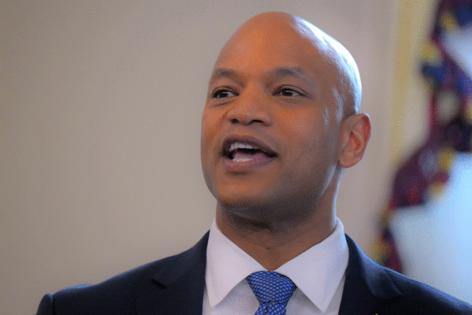Gov. Wes Moore pardons more cannabis offenses, directs $400M to disinvested communities
Published in News & Features
In recognition of Juneteenth, Maryland Gov. Wes Moore on Thursday announced the pardon of nearly 7,000 additional cannabis-related offenses and the allocation of $400 million in state funds to communities historically impacted by discriminatory policies.
“We saw that, even after Juneteenth, there were still some very creative policies that were put in place that was focusing on increasing a racial wealth gap and having some of the greatest wealth theft that we saw in our nation’s history,” Moore, a Democrat, said in a Thursday morning interview with The Baltimore Sun.
“This is one of the most aggressive actions in our state’s history to make a focused effort to be able to target state investments that help reverse decades of racist and discriminatory policies.”
The executive clemency order, issued during a visit to Bethel AME Church in Cambridge, clears 6,938 cases of simple cannabis possession that were not included in Moore’s June 2024 mass pardon of more than 175,000 offenses. State officials said those cases were initially missed due to data coding errors in the Maryland Judiciary’s system. The cases were identified during preparations to implement the governor’s recently passed Expungement Reform Act.
In addition to the pardons, Moore also announced that $400 million will be designated for Department of Housing and Community Development (DHCD) programming in 419 of Maryland’s 1,463 census tracts that are home to historically underserved communities to undo decades of discriminatory policies like redlining, urban highway construction and mass incarceration.
Nearly half of these census tracts, which are now designated as “Just Communities,” are in Baltimore City.
The Just Communities designation will go into effect on July 1.
The designations stem from 2024 legislation introduced on behalf of DHCD, directing the agency to map historic harms through the lens of current conditions and make investment recommendations to the governor.
DHCD Secretary Jake Day said Thursday morning that, in his role, he wants to address historical injustices.
“It’s not just about current conditions,” he said of Just Communities. “It’s about those past harms and the intent — the government-driven, I would say, collusion-backed intent between multiple centers of society, government, finance … to hold certain places back based on the racial composition of those neighborhoods.”
To qualify for the designation, areas must show evidence of both historical and present inequities, including high incarceration rates, legal segregation, disparate exposure to environmental and health risks, and disruption from highway and road projects, such as Baltimore’s Highway to Nowhere. The designation lasts for five years, and projects in Just Communities will receive priority consideration for state funding.
DHCD will recommend that funding be allocated to these communities to implement some of its programs, including its digital equity broadband initiative and its state small business credit initiative.
All Just Communities lie within existing priority funding areas, and 84% overlap with communities that are eligible for funding through Moore’s initiative to end childhood poverty through the ENOUGH Act.
Moore previewed the Juneteenth announcement during his May commencement speech at the University of Maryland Eastern Shore, one of Maryland’s four Historically Black Colleges and Universities. He said the decision to make his announcement Thursday on the Eastern Shore was intentional, citing the region’s dual history as a birthplace of prominent Black leaders like Harriet Tubman and Frederick Douglass, and as a site of early redlining and incarceration practices.
It “represents a place of pride” and “a place of prejudice,” Moore said, noting that it was one of the early entry points of the Underground Railroad and saw some of the first mass incarceration and redlining.
“I think it’s appropriate — not just in the case of Maryland history, but in the case of American history — that we center this work of repair on one of the first places that showed America’s brokenness,” he said.
While Moore has chosen to take action toward ending the racial wealth gap, he currently finds himself at odds with some members of the Black community.
The governor issued his veto of legislation that would have established the Maryland Reparations Commission in May — the same day he hinted at Thursday’s announcement at UMES.
The bill would have launched a two-year study into whether the state should provide reparations to Marylanders impacted by the state’s history of slavery and racial inequity.
“I have a fundamental disagreement with the General Assembly on what’s required inside this moment,” he said. “I believe that this is a moment for action. I believe that this is a moment where we want to put together policies that are actually helping to address the harm that was … historically done.”
_____
©2025 Baltimore Sun. Visit baltimoresun.com. Distributed by Tribune Content Agency, LLC.







Comments